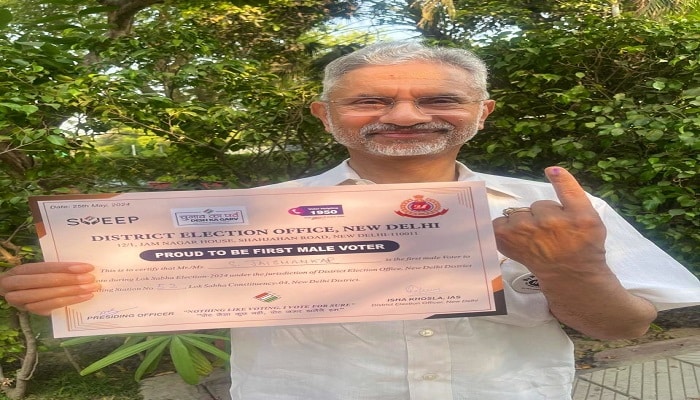PNN – With the beginning of the sixth phase of the Indian Parliament elections, the Minister of Foreign Affairs of India published a photo of himself and wrote: I cast the first vote for democracy.
According to the report of Pakistan News Network, With the start of the sixth phase of the Indian House of Commons elections, this election has reached its penultimate stage and voters from eight states and federal union territories are ready to decide the fate of 889 candidates.
Among some prominent candidates, Kanaya Kumar, a former student activist leader and staunch critic of Indian Prime Minister Narendra Modi, is challenging incumbent MP Manoj Tiwari, an actor and singer from the Bhojpuri-speaking region in the Northeast Delhi constituency. While Education Minister Dharmendra Pradhan seeks to enter the Lok Sabha, the House of Commons of the Indian Parliament, from Sambalpur in the eastern state of Odisha.
In the sixth phase, voters will go to the polls to elect the winners of all seven seats in the Indian capital region, which is the home base of the local ruling Aam Aadmi Party (AAP).
The Indian Inclusive National Development Alliance (INDIA), led by the ruling party’s main opposition party, the National Congress Party, has vowed to address economic woes and lack of job creation as it aims to challenge the electoral dominance of the National Democratic Alliance (NDA).
Who will vote in the sixth stage?
Registered voters in the following six states and two union territories will cast their votes for 58 seats:
Haryana: All 10 constituencies
Jharkhand: four constituencies out of 14 constituencies
Odisha: six out of 21 constituencies
Uttar Pradesh: 14 out of 80 constituencies
Bihar: eight constituencies out of 40 constituencies
West Bengal: eight out of 42 constituencies
Delhi: All seven constituencies of the capital region
Jammu and Kashmir: One of the five Union constituencies where voting was postponed from Phase 3 to Phase 6 due to weather conditions.
The most important part of this phase of the election is the New Delhi election, which has been made difficult by the fierce attack of the region’s popular state chief minister Arvind Kejriwal after he was released from jail on bail in a corruption case. He has accused the ruling party of using investigative agencies to accuse him. A number of opposition party leaders have either been jailed or are facing corruption cases. The Kejriwal-led Aam Aadmi Party has allied with the Congress Party to win seven seats in Delhi.
The seventh and final stage of the elections will be held on June 1. The counting of votes will be done on June 4 and the results are likely to be announced on the same day.
The first five phases of the Lok Sabha elections have determined the fate of 429 parliamentarians.
Indian Foreign Minister Subramaniam Jaishenkar, publishing a photo as the first male voter in New Delhi, wrote: I cast the first vote for India’s democracy.
Voting in the general elections of the House of Commons of India known as Lok Sabha has started on April 19.
Indian Prime Minister Narendra Modi’s Bharatiya Janata Party (BJP) hopes to win the necessary parliamentary majority, amid growing criticism that India’s democracy has been undermined since the party came to power 10 years ago.
With more than 969 million eligible voters representing more than 10% of the world’s population, the Indian elections are considered the largest democratic exercise in the world.
The candidates of this election are competing for 543 seats in seven stages, and the counting of votes took place place on June 4 after voting on April 19, April 26, May 7, May 13, May 20, May 25 and June 1.
The voting age is 18 years and candidates must be at least 25 years old.

